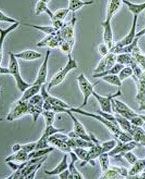
A FATTY acid found in oily fish could be combined with a commonly used anaesthetic to develop drugs to treat breast cancer, according to research published in the journal Breast Cancer Research early last month.
Compounds of Omega-3 fatty acids and propofol reduce the ability of breast cancer cells to develop into malignant tumours, inhibiting cancer cell migration by 50 per cent and significantly reducing their metastatic activity. These new compounds could be developed into a new family of anti-cancer drugs.
Breast cancer is the most common malignancy among Pakistani women, having an incidence of 15 to 26 per cent in the 30-49 years age group. It is the most frequent malignancy in women, as it accounts for 38.5 per cent of all cancers.
About half (43.7 per cent) of all breast cancers are locally advanced. The Pakistani population is reported to have the highest rate of breast cancer in Asia and has one of the highest rates of ovarian cancer worldwide. The age-standardized (global) rate of breast cancer in Karachi is 51.7 per 100,000 per year. All other Asian registries report breast cancer rates of less than 40 per 100,000 per year, except for Manila in the Philippines (47.7 per 100,000 per year).
The breast cancer rates reported in the provinces of neighbouring India — ranging from 8.7 per 100,000 per year in Barshi, Paranda and Bhum to 28.2 per 100,000 per year in Bombay — are considerably lower than those of Pakistan. An estimated 215,990 new cases of breast cancer were estimated in 2004 in the US.
Factors predisposing to the development of breast cancer in the US and Europe include late pregnancies, lack of breastfeeding and having few children. However, these parameters are not particularly relevant in Pakistan, where 70 per cent of patients have no identifiable risk factors.
There is a need to collect better information pertaining to the epidemiology of cancers in Pakistan, since it is believed that their incidence is rising. It is also essential to collect information about the dietary habits of people in Pakistan.
Institutes in Pakistan, including Shaukat Khanum Hospital and Research Centre in Lahore, and the Aga Khan University and the HEJ Research Institute in Karachi have the resources to carry out collaborative research on the beneficial effects of nutrition and guide the people to prevent cancers.
Meanwhile, the oils of certain cold-water fish have a well-documented role in inhibiting or preventing cancer. Epidemiological evidence strongly links fish oil to low incidences of several cancers. The anti-cancer properties of fish oils have been attributed to the Omega-3 fatty acids, docosahexaenoic acid (DHA) and eicosapentaenoic acid (EPA). Proof of these fatty acids as anti-cancer agents has been substantiated by dietary studies on many types of animals, including humans and in cultured cells.
A number of reports have indicated that DHA’s anti-cancer properties are not directly due to cytotoxicity, but rather to the fatty acid’s ability to induce apoptosis (programmed cell death). However, the molecular mechanism for the anti-cancer actions of omega-3 fatty acids remains unknown. Understanding the mechanistic effects of Omega-3 lipids may aid in the development of new cancer therapies.
My research group at the Methodist Research Institute and Indiana University in Indianapolis, United States, reported in the June issue of Breast Cancer Research (https://breast-cancer-research.com/) that the Omega-3 fatty acids EPA and DHA boost the anti-cancer activity of the drug propofol when conjugated with the drug.
Propofol is an anesthetic with antioxidant properties that inhibits cancer cell migration by 5 to 10 per cent. Omega-3 fatty acids such as DHA and EPA have a minimal effect on cancer cells when applied alone. The results of the study show that propofol and DHA or EPA has a much more significant effect on cancer cells when used in combination, as conjugates, than when used alone.
The conjugates inhibit cancer cell adhesion by 15 and 30 per cent respectively, reduce cell migration by 50 per cent and increase apoptosis by 40 per cent. In conclusion, the study showed that the novel propofol-DHA and propofol-EPA conjugates reported might be useful for the treatment of breast cancer.



.jpg)













Share your comments & questions here
No comments yet. Be the first to comment!